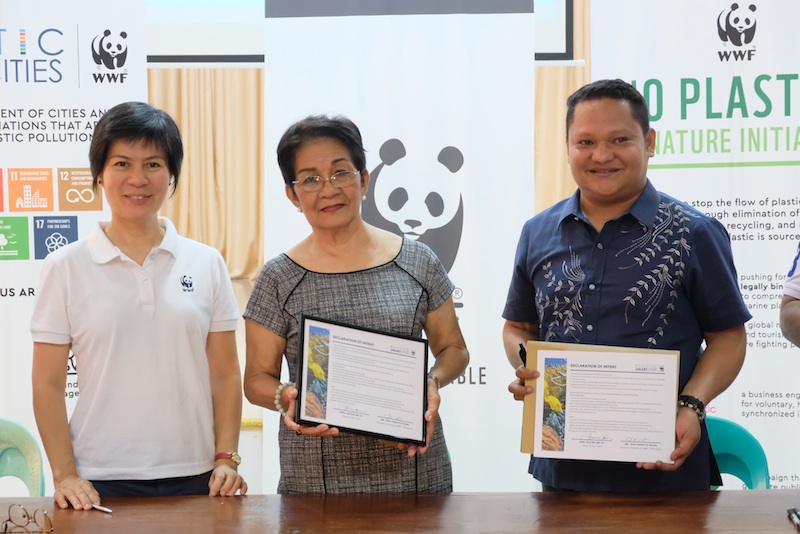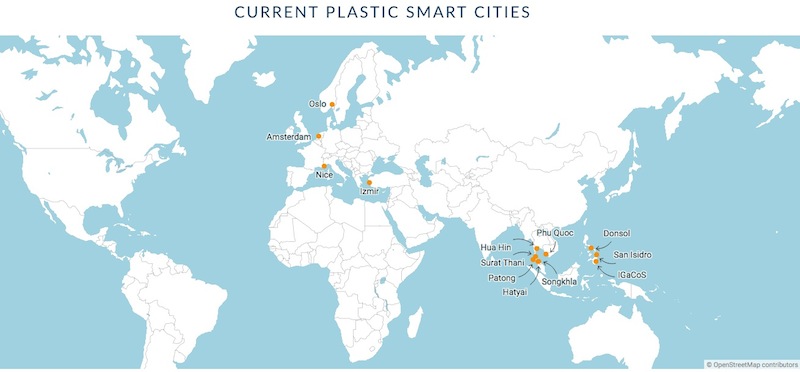SAN ISIDRO, Davao Oriental (MindaNews / 03 December) – The Island Garden City of Samal in Davao del Norte and San Isidro town in Davao Oriental vowed “to eliminate plastic pollution in 10 years” by signing up with the Plastic Smart Cities movement initiated by the World Wild Fund for Nature (WWF).
Samal joined the movement on Monday followed by San Isidro on Tuesday.
 Chrisma Salao (L), WWF-Philippines Vice President for Conservation Program, San Isidro, Davao Oriental Mayor Justina Yu and Councilor Joel Mamac, Sangguniang Bayan committee on environment chair, during the signing of the declaration of intent for WWF’s Plastic Smart Cities movement on Tuesday, 3 December 2019, in San Isidro, Davao Oriental. MindaNews photo by BONG S. SARMIENTO
Chrisma Salao (L), WWF-Philippines Vice President for Conservation Program, San Isidro, Davao Oriental Mayor Justina Yu and Councilor Joel Mamac, Sangguniang Bayan committee on environment chair, during the signing of the declaration of intent for WWF’s Plastic Smart Cities movement on Tuesday, 3 December 2019, in San Isidro, Davao Oriental. MindaNews photo by BONG S. SARMIENTO
The Plastic Smart Cities movement is a global initiative for cities and tourism destinations that are fighting plastic pollution and is part of WWF’s global No Plastics in Nature initiative.
According to its website, Plastic Smart Cities is “the knowledge sharing platform on plastics, where all stakeholders join together for a Plastic Free Ocean. Here we connect problem owners with vetted solutions and solution providers.”
3 from Philippines
In the Philippines, only three areas have so far joined the WWW’s war against plastics: Samal, San Isidro and Donsol in Sorsogon.
The three areas are tourism destinations offering different attractions.
 From the website of Plastic Smart Cities. The WWF is urging other areas to sign up and be part of the global campaign.
From the website of Plastic Smart Cities. The WWF is urging other areas to sign up and be part of the global campaign.
Samal Island, which is Davao City’s closest tourism getaway, is known for its white sand beaches and the Monfort Bat Sanctuary.
San Isidro town’s tourist drawer is the Mt. Hamiguitan Range Wildlife Sanctuary, which UNESCO declared as a world heritage site for its diverse flora and fauna ecosystem. It was also declared an ASEAN Heritage Park.
Donsol is famous for the butanding or whale shark boat ride sight-seeing tours.
Chrisma Salao, WWF-Philippines Vice President for Conservation Program, said the global conservation non-profit has been working on climate change adaptation and marine protection projects in the Davao Gulf since 2008.
Samal and San Isidro, she said, “have taken an important step in securing a sustainable future for their residents.”
Salao said they will help these localities minimize, prevent and manage plastics both as a livelihood resource and as a waste.
She called for unity against the war on plastic trash, stressing this poses danger to the environment, health and the economy.
Today, an estimated 80% of plastic marine debris comes from land-based sources with a large portion coming from urban areas as polluted waterways carry plastic pollution to the ocean, WWF data showed.
Timely
Samal Mayor Al David Uy said the Plastic Smart Cities project is “timely” as Samal Island aims to extend the life span of its sanitary landfill through plastics reduction.
In order to help stop the eight million tons of plastic waste that leaks into the ocean each year, WWF and Samal agreed to work on achieving “100% plastic waste diversion by 2030” through residuals processing, education campaign, segregation and recycling, and the implementation of its Environmental Code of 2018.
By joining WWF’s war against plastic wastes, San Isidro also committed to generate and support circular solutions for addressing the plastics problem in the locality.
Mayor Justina Yu said San Isidro town is implementing the “Dili Nako sa Plastik’ (I am Against Plastic), a local environment and livelihood program on plastic recovery and recycling.
“We should set the example now for the sake of our future generation, ” she said.
The local government declared a war against plastics after some sea turtles were found dead in their coastal villages with plastics in their internal organs, Yu said. (Bong S. Sarmiento / MindaNews)
